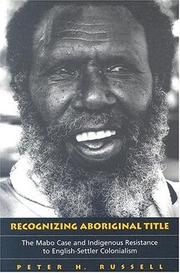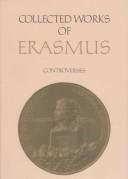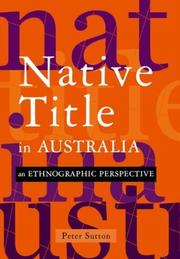| Listing 1 - 10 of 15 | << page >> |
Sort by
|
Periodical
Publisher: Canberra : AIATSIS Native Title Research Unit
Abstract | Keywords | Export | Availability | Bookmark
 Loading...
Loading...Choose an application
- Reference Manager
- EndNote
- RefWorks (Direct export to RefWorks)
Native title (Australia) --- Land tenure --- Aboriginal Australians --- Torres Strait Islanders --- Law and legislation --- Civil rights --- Australia.

ISBN: 9781442657199 1442657197 0802094430 9780802094438 0802038638 9780802038630 9781442659254 1442659254 Year: 2005 Publisher: Toronto
Abstract | Keywords | Export | Availability | Bookmark
 Loading...
Loading...Choose an application
- Reference Manager
- EndNote
- RefWorks (Direct export to RefWorks)
Annotation
Torres Strait Islanders --- Native title (Australia) --- Land tenure. --- Civil rights. --- Legal status, laws, etc. --- Mabo, Eddie --- Aborigines. --- Torres Strait Islands
Periodical
ISSN: 14457776 Year: 1993 Publisher: Canberra, ACT : Australian Govt. Pub. Service,
Abstract | Keywords | Export | Availability | Bookmark
 Loading...
Loading...Choose an application
- Reference Manager
- EndNote
- RefWorks (Direct export to RefWorks)
Native title (Australia) --- Land tenure --- Aboriginal Australians --- Torres Strait Islanders --- Law and legislation --- National Native Title Tribunal (Australia) --- Australia.
Periodical
Publisher: Canberra : AIATSIS Native Title Research Unit
Abstract | Keywords | Export | Availability | Bookmark
 Loading...
Loading...Choose an application
- Reference Manager
- EndNote
- RefWorks (Direct export to RefWorks)
Native title (Australia) --- Land tenure --- Aboriginal Australians --- Torres Strait Islanders --- Law and legislation --- Civil rights --- Civil rights. --- Land tenure. --- Law and legislation. --- Australia. --- Native title.

ISBN: 0802043976 0802038638 9781442673397 1442673397 9780802043979 1282028820 9786612028823 0802094430 1442659254 1442657197 Year: 2005 Volume: 84 Publisher: Toronto
Abstract | Keywords | Export | Availability | Bookmark
 Loading...
Loading...Choose an application
- Reference Manager
- EndNote
- RefWorks (Direct export to RefWorks)
This new volume of the CWE presents three of Erasmus' polemic works against Alberto Pio, Prince of Carpi. A leading diplomat of the period, patron of artists and humanists, and conservative Catholic, Pio continually angered Erasmus by criticizing him for his denunciations of church practices and officials, and by accusing him of supporting Luther and holding dangerous opinions. The texts are lucid, passionate, and even vitriolic at times.The introduction by Nelson H. Minnich provides a biography of Pio, an overview of the controversy and related texts, and a bibliographical conspectus of source-texts. The translation is by Daniel J. Sheerin. The annotation by Minnich and Sheerin is wide-ranging and informative, answering questions posed by the text and placing the reader firmly in the sixteenth-century context of the dispute.This is the first English translation of the Alberto Pio controversies. In the CWE series it follows on volumes 71-83, which contain Erasmus' controversies with other critics on theological, political, social, philological, and educational matters.
Pio, Alberto, --- Christianity --- Christian literature, Latin (Medieval and modern) --- Greek & Latin Languages & Literatures --- Languages & Literatures --- Neo-Latin literature --- Torres Strait Islanders --- Native title (Australia) --- Aboriginal title (Australia) --- Australian aboriginal title --- Aboriginal Australians --- Land titles --- Ethnology --- Indigenous peoples --- Land tenure. --- Civil rights. --- Legal status, laws, etc. --- Land tenure --- Mabo, Eddie --- Mabo, Edward Koiki --- Mabo, Koiki --- Aborigines. --- Torres Strait Islands --- Archipel --- Torresstraße
Book
ISBN: 1921313528 192131351X 9781921313523 Year: 2007 Publisher: Canberra, Australian Capital Territory : Australian National University E Press,
Abstract | Keywords | Export | Availability | Bookmark
 Loading...
Loading...Choose an application
- Reference Manager
- EndNote
- RefWorks (Direct export to RefWorks)
Law - Non-U.S. --- Law, Politics & Government --- Law - Africa, Asia, Pacific & Antarctica --- Native title (Australia) --- Social aspects. --- Aboriginal title (Australia) --- Australian aboriginal title --- Aboriginal Australians --- Land titles --- Torres Strait Islanders --- Land tenure --- Ethnology --- Cultural anthropology --- Ethnography --- Races of man --- Social anthropology --- Anthropology --- Human beings --- Native title.

ISBN: 1107144418 1280437618 0511184360 0511166192 0511164262 0511312962 0511481632 0511165064 9780511184369 9780511166198 9780511165061 0511162669 9780511162664 9780511481635 9780521812580 0521812585 9786610437610 6610437610 0521812585 9781280437618 9780521011907 0521011906 Year: 2004 Publisher: New York : Cambridge University Press,
Abstract | Keywords | Export | Availability | Bookmark
 Loading...
Loading...Choose an application
- Reference Manager
- EndNote
- RefWorks (Direct export to RefWorks)
Native title has often been one of the most controversial political, legal and indeed moral issues in Australia. Ever since the High Court's Mabo decision of 1992, the attempt to understand and adapt native title to different contexts and claims has been an ongoing concern for that broad range of people involved with claims. In this book, originally published in 2003, Peter Sutton sets out fundamental anthropological issues to do with customary rights, kinship, identity, spirituality and so on that are relevant for lawyers and others working on title claims. Sutton offers a critical discussion of anthropological findings in the field of Aboriginal traditional interests in land and waters, focusing on the kinds of customary rights that are 'held' in Aboriginal 'countries', the types of groups whose members have been found to enjoy those rights, and how such groups have fared over the last 200 years of Australian history.
Aboriginal Australians --- Land tenure --- Native title (Australia) --- Customary law --- Aboriginal title (Australia) --- Australian aboriginal title --- Land titles --- Torres Strait Islanders --- Land tenure. --- Civil rights. --- Legal status, laws, etc. --- Law and legislation --- Australia --- Race relations. --- Social policy. --- Politics and government. --- Social Sciences --- Anthropology --- Native title. --- Government policy. --- Politics and Government - Civil rights and citizenship. --- Law - Indigenous.
Book
ISBN: 077482073X 1280777850 9786613688248 0774815620 0774815604 0774815612 9780774815628 9780774815604 9780774815611 Year: 2010 Publisher: Vancouver : UBC Press,
Abstract | Keywords | Export | Availability | Bookmark
 Loading...
Loading...Choose an application
- Reference Manager
- EndNote
- RefWorks (Direct export to RefWorks)
"Delgamuukw. Mabo. Ngati Apa. These cases and others have in recent years created a framework for litigating Aboriginal title in countries such as Canada, Australia, and New Zealand. The contributors to this path-breaking book argue that our understanding of where the concept of Aboriginal title came from -- and where it may be going -- can also be enhanced by exploring legal developments in these former British settler colonies in a comparative and multidisciplinary framework. Aboriginal Title and Indigenous Peoples brings together a distinguished group of scholars who trace how the doctrine of Aboriginal title evolved as indigenous peoples and their laws interacted with settlers and the legal systems that developed in these three common law countries. Part 1 reveals the historical role that legislatures and courts played in the extinguishment and acquisition of Aboriginal title and land. Part 2 shows that although each country's development was distinctive, common issues and legal developments shaped -- and continue to inform -- indigenous peoples' struggle for recognition of their rights."--pub. desc.
Indigenous peoples --- Native title (Australia) --- Indian title --- Legal status, laws, etc. --- Indigenous title --- Aboriginal Indian title --- Indian right of occupancy --- Original Indian title --- Recognized Indian title --- Tribal right of occupancy --- Indians of North America --- Land titles --- Aboriginal title (Australia) --- Australian aboriginal title --- Aboriginal Australians --- Torres Strait Islanders --- Land tenure --- Ethnology
Book
ISBN: 9781760642846 1760642843 1743821964 Year: 2021 Publisher: Carlton, Victoria : Black Inc.,
Abstract | Keywords | Export | Availability | Bookmark
 Loading...
Loading...Choose an application
- Reference Manager
- EndNote
- RefWorks (Direct export to RefWorks)
In the space of just fifteen years, Andrew Twiggy Forrest's Fortescue Metals Group has become a global iron-ore giant worth 70 billion dollars. But in its rush to develop, FMG has damaged and destroyed ancient Aboriginal heritage and brokered patently unfair agreements with the traditional owners of the land. When FMG has met resistance, it has used hard-nosed litigation in pursuit of favourable outcomes. This strategy came unstuck when FMG encountered several hundred Yindjibarndi people and their leader, Michael Woodley, who left school in Grade Six and was from then on immersed in his traditional culture. Woodley has led his community in an epic, thirteen-year battle against FMG, all on a shoestring budget. Clear-eyed and humane, Title Fight reveals the Wild West of iron-ore mining in the Pilbara. It tells the story of how a small group of Indigenous Australians fought tenaciously to defend their spiritual connection to Country. And, at a moment of national reckoning with our colonial and ancient past, with our relationship to the land, it asks some critical questions: Who does the land belong to? Who gets to choose what its used for? And whose side are we on?
Mining corporations --- Native title (Australia) --- Aboriginal Australians --- Aboriginal Australians --- Aboriginal Australians --- Iron ores --- Iron mines and mining --- Land tenure --- Mines and mining --- Mines and mining --- Law and legislation --- Forrest, Andrew. --- Woodley, Michael. --- Forrest, Andrew. --- Fortescue Metals Group Ltd. --- Fortescue Metals Group Ltd. --- Western Australia
Book
ISBN: 1921862432 1921862424 9781921862434 9781921862427 Year: 2011 Publisher: Acton, A.C.T. : ANU E Press,
Abstract | Keywords | Export | Availability | Bookmark
 Loading...
Loading...Choose an application
- Reference Manager
- EndNote
- RefWorks (Direct export to RefWorks)
Anthropologists have been appearing as key expert witnesses in native title claims for over 20 years. Until now, however, there has been no theoretically-informed, detailed investigation of how the expert testimony of anthropologists is formed and how it is received by judges. This book examines the structure and habitus of both the field of anthropology and the juridical field and how they have interacted in four cases, including the original hearing in the Mabo case. The analysis of background material has been supplemented by interviews with the key protagonists in each case. This allows the reader a unique, insider's perspective of the courtroom drama that unfolds in each case. The book asks, given the available ethnographic research, how will the anthropologist reconstruct it in a way that is relevant to the legal doctrine of native title when that doctrine gives a wide leeway for interpretation on the critical questions.
Evidence, Expert --- Forensic anthropology --- Aboriginal Australians --- Native title (Australia) --- Law - Non-U.S. --- Law, Politics & Government --- Law - Africa, Asia, Pacific & Antarctica --- Legal status, laws, etc --- Legal status, laws, etc. --- Aboriginal title (Australia) --- Australian aboriginal title --- Anthropology, Forensic --- Medicolegal anthropology --- Expert evidence --- Expert testimony --- Expert witness --- Expert witnesses --- Opinion evidence --- Scientific evidence (Law) --- Land titles --- Torres Strait Islanders --- Forensic sciences --- Physical anthropology --- Evidence (Law) --- Witnesses --- Land tenure --- Anthropology --- Native title - Expert evidence. --- Anthropology - Theory and criticism.
| Listing 1 - 10 of 15 | << page >> |
Sort by
|

 Search
Search Feedback
Feedback About UniCat
About UniCat  Help
Help News
News